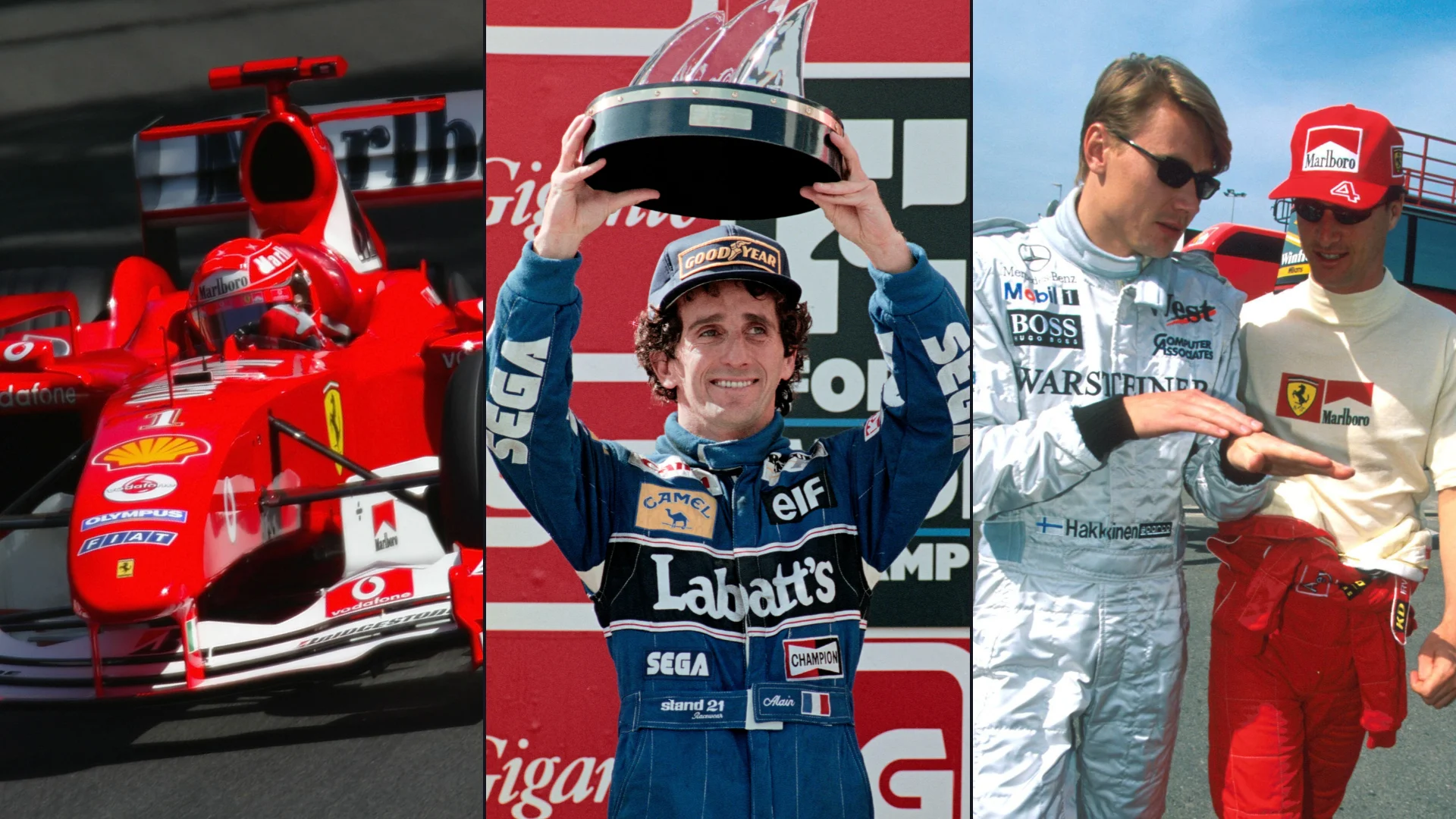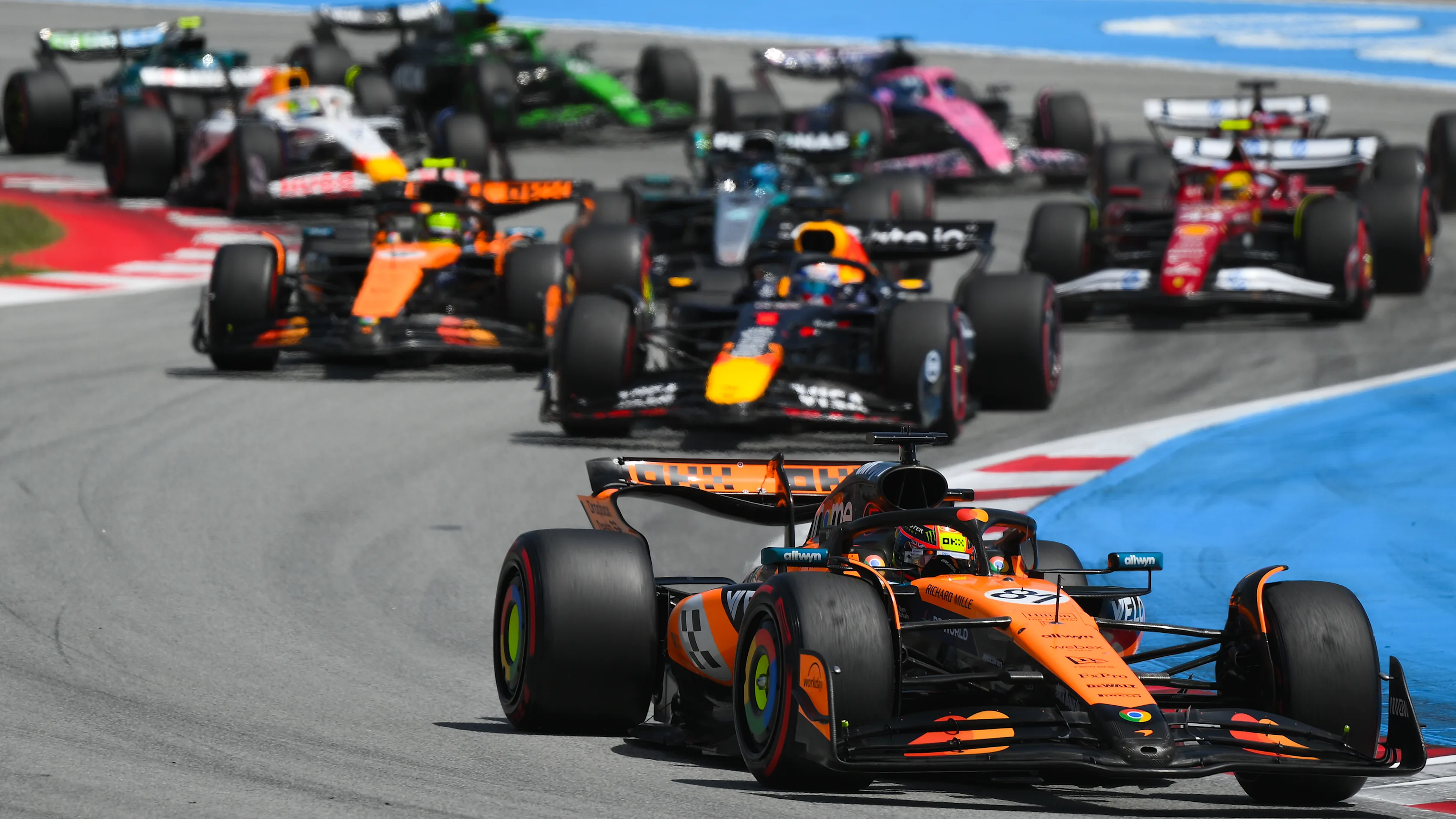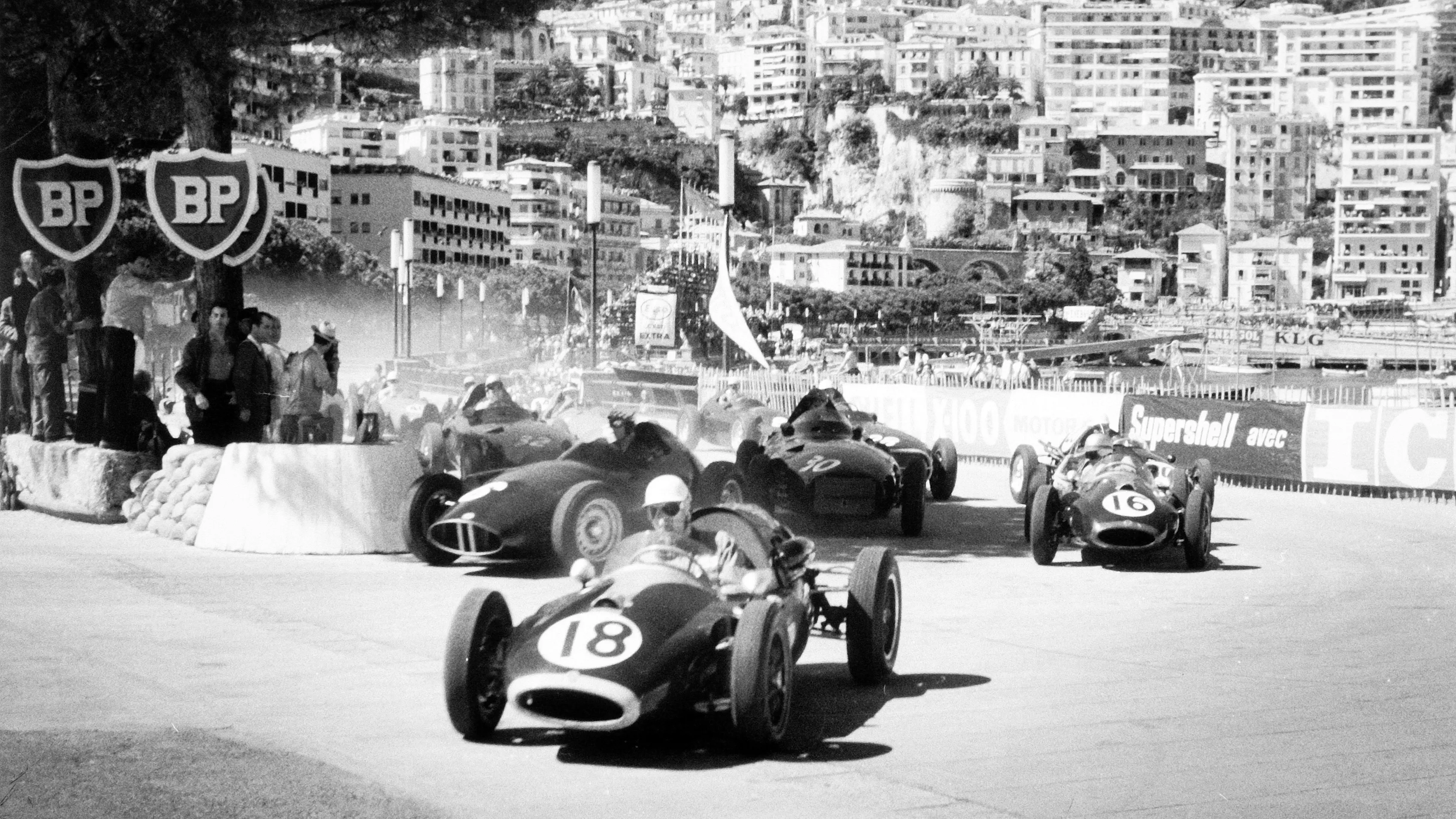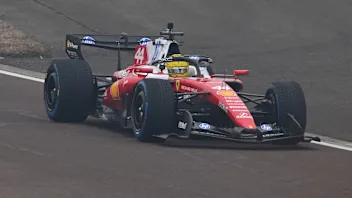How many World Championships would F1 drivers have won using the current 2025 points system?
The points system in Formula 1 has undergone various changes over the years – but how would seasons gone by have turned out if today's format had been in play?

In its 75 years so far, Formula 1 has continued to evolve and grow, meaning that there have been various developments along the way.
One area of the sport to have undergone a few changes over the years is the points system. That got us thinking – how different would the history books look if today’s points format had been in play from the very start of the championship back in 1950?
Well, now we have the answer thanks to our F1 data team, who have been hard at work recalculating how each season would have turned out based on the modern points-scoring system. But before we get to the intriguing findings, let’s recap on just how the system has developed.
How does the 2025 points system differ to the past?
The current points system – introduced back in 2010 – awards the top 10 drivers, with 25 points given to the winner, which then scales down to 18, 15, 12, 10, 8, 6, 4, 2 and one point for the 10th-placed driver.
Points are also given to the first eight finishers in the Sprint, from 8 for first place down to a single point for P8. The driver to have then collected the most points by the end of the season becomes World Champion.
Since 2019, a driver finishing in the top 10 could also earn a bonus point by setting the fastest lap of the race, but this was removed for the 2025 season.

The F1 points system has gone through various changes across previous eras in the sport's 75 years of history; only the top five scored in the championship’s early years, for example, with this extending to the top six in 1960, which then became the first eight finishers in 2003.
Fewer points were also awarded – the winner initially clinched eight points before this grew to nine, 10 and then the modern-day 25 in the years that followed. The Drivers' Championship, meanwhile, was decided based on a certain number of the driver’s best results, a system that remained in play until 1991.
How our data team recalculated past seasons based on the 2025 system
While history cannot be rewritten, it is possible to calculate how F1 seasons gone by would have played out had the modern-era points system been in effect – and, thanks to our data team, we have been able to do just that.

To explain their working, our analysts recalculated the number of World Championships that each driver would have won using the 2025 scoring system in races only (excluding Sprints).
Additionally, this provided further data on how many consecutive titles drivers would have taken based on today’s points format.
The results of both provided some fascinating insights – and some clear changes for certain famous names. A total of 34 drivers have actually been a Formula 1 World Champion – but, had the current points system been used throughout, this would have been reduced to 33.
Some drivers would have gained significantly had the 2025 points been used during their time in the sport – while others would have lost out. Let’s take a closer look at the results….

Which drivers would have gained from the 2025 points system?
Of the drivers to only narrowly miss out on winning a title in the past, arguably one of most memorable is Eddie Irvine. After Ferrari team mate Michael Schumacher was sidelined with a broken leg, the Northern Irishman battled with McLaren’s Mika Hakkinen for the 1999 World Championship.
As it was, Irvine missed out by just two points – however, our calculations show that Irvine would in fact have become a World Champion by today’s points system, making him the only non-title winning driver to hypothetically gain the crown in our data.
In reality, Irvine took the championship lead at Round 10 in Germany before losing it again at Round 12 in Belgium, tying at Round 13 in Italy, again losing it to Hakkinen following Round 14 at the Nurburgring, then retaking it by four points at the penultimate race in Malaysia, before ultimately being beaten by Hakkinen by two points at the Suzuka season finale.
However, with the modern points system, Hakkinen’s retirement at Silverstone – a race in which Irvine finished in second – would have allowed Irvine to capitalise to a much greater extent, meaning that the Ferrari driver would have gained enough of an advantage to take the title lead from Hakkinen in Austria and continue to hold it through to the campaign’s end, with a final advantage of 21 points.
Perhaps the most notable name that would have gained from the 2025 points system, however, is Alain Prost. The Frenchman took the crown on four occasions during his extensive F1 career – but this would have been an impressive seven using the modern-day points format.
The history books show that Prost claimed his first World Championship in 1985. However, using today’s scoring, that maiden title would have arrived two years earlier. During the 1983 campaign, Prost lost out to Nelson Piquet in the title fight – but our data shows that, using today’s scoring, the pair would have finished on equal points. With Prost claiming more wins than his rival, he would have been the one to be awarded the championship.
After joining McLaren in 1984, Prost was involved in another battle for the crown with team mate Niki Lauda. This time the French driver missed out by an agonising half a point, but the 2025 system would have seen him beat the Austrian by 17 points.
One of Prost’s most memorable championship duels came in 1988, a year in which his infamous intra-team rivalry with Ayrton Senna began at McLaren. The team’s dominant MP4/4 allowed them to claim victory in all but one race, but it was ultimately Senna who pipped Prost by three points to score what was a debut title for the Brazilian.
However, had 2025’s points system been in effect, Prost would have won the championship on 301 points to Senna’s 275, meaning that – in addition to the titles he actually achieved in 1985, 1986, 1989 and 1993 – the driver known as ‘the Professor’ would hypothetically have claimed a total of seven title triumphs.
Interestingly, a father and son duo would also have benefitted from today’s system; our statistics show that two-time champion Graham Hill would have in fact won three titles while son Damon Hill emerges as a double World Champion instead of being a one-time victor.
For Hill senior – who took the crown in 1962 and 1968 – our data shows that a third triumph would have come in 1964 based on the 2025 points format, with the Briton beating actual champion John Surtees by seven points.
As for Hill junior, his sole championship arrived in 1996, two years after missing out to Michael Schumacher by just one point. Using today’s points, however, Hill would have earned the title in that closely-fought 1994 campaign, in which his score would stand at 252 points in contrast to 236 for Schumacher.
Which drivers would have lost out from the 2025 points system?
While the likes of Irvine have gained a title through our data, some actual World Champions would in turn have missed out had today’s points system been in play.
As mentioned above, one-time champion Surtees would have lost out on his win to Graham Hill using the 2025 scoring, while another name to see their title hypothetically disappear is James Hunt.
The 1976 season has gone down in F1 history for featuring one of the most famed championship duels between Hunt and rival Lauda, a battle so filled with twists and turns that it spawned the 2013 film Rush.
In reality, Hunt beat Lauda by just one point after the Austrian – who had led the standings following the penultimate round of the campaign at Watkins Glen – withdrew from the season-ending Japanese Grand Prix amid treacherous weather conditions.
However, had today’s points format been used, Lauda would have emerged as champion – but still only by the fine margin of two points.
Additionally, the data shows that – based purely on points scored – Jacques Villeneuve would have been beaten by Michael Schumacher in the 1997 season, a year in which the Canadian claimed his one and only World Championship in the sport.
As it was, Villeneuve’s total tally of 81 put him three clear of Schumacher, while the 2025 system gives the latter 229 points, marking a seven-point margin over Villeneuve’s 222.
What this does not take into account, however, is that the German was later disqualified from the campaign following a controversial collision with Villeneuve during the season finale at Jerez, meaning that his second place in the championship was voided.
As such, even if he had outscored Villeneuve as today’s points system would have allowed, the title would still not have gone to Schumacher. And with Hill having hypothetically taken the 1994 championship according to our data, this means that the seven-time World Champion would instead have a tally of six.
Other World Champions also see their total number of titles decrease using today’s points system. As previously mentioned, Piquet and Senna would have lost out to Prost in 1983 and 1988 respectively, meaning that the Brazilian drivers would each have two titles rather than three.
Additionally, Irvine’s hypothetical 1999 triumph in our findings means that Hakkinen would have missed out on scoring back-to-back championships following his win in 1998, putting the Finn on a total of one title instead of two.
Number of titles won using 2025 points system
| Driver | Championships won adjusted to 2025 points system | Total championships won under 2025 points system | Actual number of championships won |
|---|---|---|---|
| Lewis Hamilton | 7.10 | 7 | 7 |
| Alain Prost | 7.04 | 7 | 4 |
| Michael Schumacher | 6.96 | 7 (excl. 1997 DSQ) | 7 |
| Juan Manuel Fangio | 4.78 | 5 | 5 |
| Sebastian Vettel | 4.10 | 4 | 4 |
| Max Verstappen | 4.01 | 4 | 4 |
| Jackie Stewart | 2.96 | 3 | 3 |
| Niki Lauda | 2.94 | 3 | 3 |
| Graham Hill | 2.93 | 3 | 2 |
| Jack Brabham | 2.87 | 3 | 3 |
| Fernando Alonso | 2.06 | 2 | 2 |
| Ayrton Senna | 2.02 | 2 | 3 |
| Nelson Piquet | 2.01 | 2 | 3 |
| Damon Hill | 2.01 | 2 | 1 |
| Emerson Fittipaldi | 1.99 | 2 | 2 |
| Jim Clark | 1.95 | 2 | 2 |
| Alberto Ascari | 1.90 | 2 | 2 |
| Kimi Raikkonen | 1.02 | 1 | 1 |
| Eddie Irvine | 1.02 | 1 | 0 |
| Keke Rosberg | 1.02 | 1 | 1 |
| Denny Hulme | 1.01 | 1 | 1 |
| Nigel Mansell | 1.01 | 1 | 1 |
| Nico Rosberg | 1.00 | 1 | 1 |
| Jody Scheckter | 1.00 | 1 | 1 |
| Mario Andretti | 1.00 | 1 | 1 |
| Jochen Rindt | 1.00 | 1 | 1 |
| Jenson Button | 1.00 | 1 | 1 |
| Alan Jones | 1.00 | 1 | 1 |
| Mika Hakkinen | 0.99 | 1 | 2 |
| Phil Hill | 0.97 | 1 | 1 |
| Mike Hawthorn | 0.94 | 1 | 1 |
| Nino Farina | 0.94 | 1 | 1 |
How many consecutive World Championships would drivers have won using the 2025 points system?
Schumacher holds the record of the most consecutive title victories at five, having continuously triumphed during a remarkable period of dominance between 2000 and 2004 – and this statistic remains unchanged in our data.
However, once again the key name to gain here is Prost. Of the Frenchman’s four championships, only two were achieved back-to-back in 1985 and 1986 – but, had today’s points system been in effect, Prost would have scored four titles in a row, given that our data sees him take the crown in 1983 and 1984.
His former McLaren team mate Lauda, meanwhile, also benefits in this category, with the data showing that the Austrian would have three consecutive championships to his name under the modern-day scoring format.
While he would have lost out to Prost on the 1984 title, our findings show that Lauda would have triumphed over Hunt in 1976, meaning that he would have achieved a hat-trick alongside his championship wins in 1975 and 1977.
Given that today’s points system has been in play since 2010, the four-year-long title-winning runs of Sebastian Vettel (2010-2013), Hamilton (2017-2020) and Max Verstappen (2021-2024) remain unchanged – and, despite the format being very different during his era, Fangio also still holds a consecutive streak of four championships in our data.
Consecutive title streaks using 2025 points system
| Driver | Consecutive championships won under 2025 points system | Actual number of consecutive championships won |
|---|---|---|
| Michael Schumacher | 5 | 5 |
| Sebastian Vettel | 4 | 4 |
| Juan Manuel Fangio | 4 | 4 |
| Max Verstappen | 4 | 4 |
| Lewis Hamilton | 4 | 4 |
| Alain Prost | 4 | 2 |
| Niki Lauda | 3 | 0 |
| Alberto Ascari | 2 | 2 |
| Ayrton Senna | 2 | 2 |
| Jack Brabham | 2 | 2 |
| Fernando Alonso | 2 | 2 |
Next Up


.webp)
.webp)

